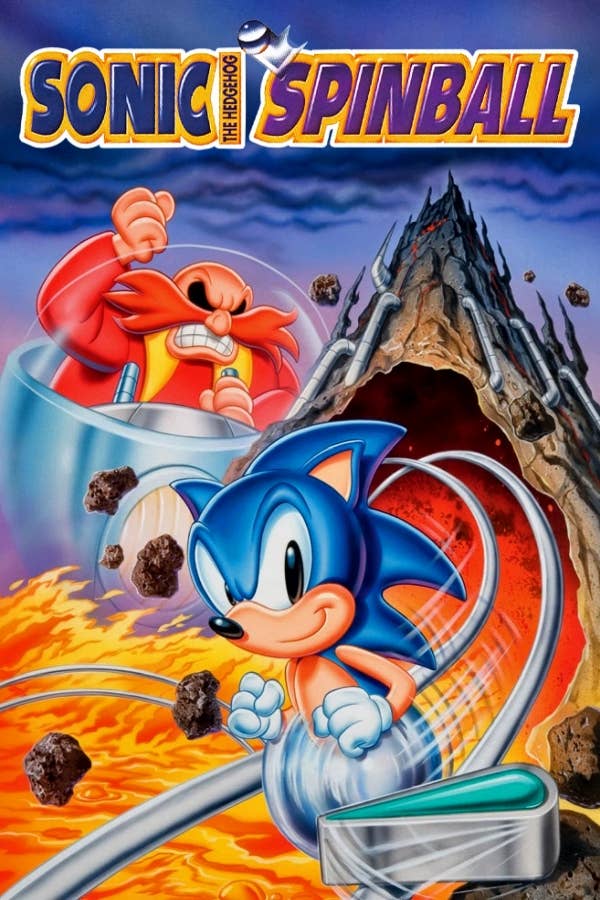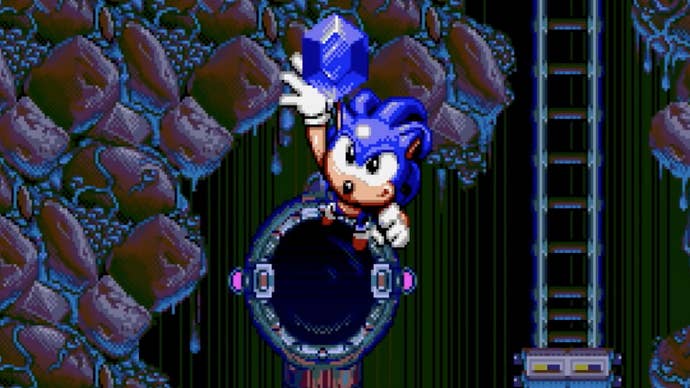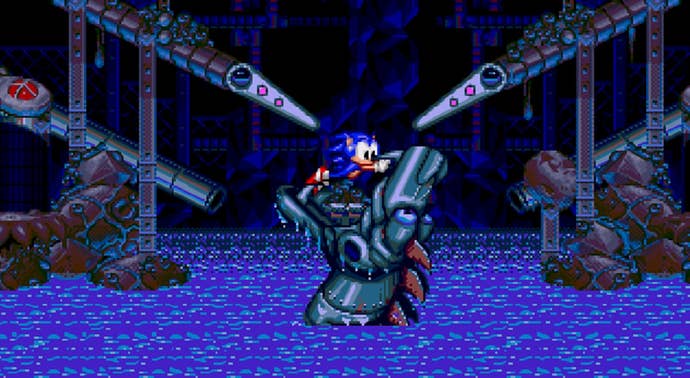
[ad_1]
The life of a gaming mascot is hard work. Just ask Sonic the Hedgehog – who has been in well over 100 games – or, depending on how you count it, double that, or more. He’s a hard working chap.
Sonic’s long-standing rival Mario is even more prestigious – but one thing that largely sets them apart is Mario’s propensity for doing relatively random stuff. Sonic dabbles from time to time, but you don’t typically find him masquerading as a doctor or whatever else. Sonic is usually a speedy hero or racer, just in different forms. But in honesty, a lot of those forms aren’t all that great.
One of them is truly brilliant, however. And it’s 30 years old today. I’m talking, of course, about Sonic Spinball. Spinball remains a remarkable, brilliant game – and for my money, it’s probably the best non-platformer Sonic game, unless you count the more general ‘Sonic & Sega All-Stars’ crossover kart racers as Sonic games. I don’t, because, well, they’re crossover games; they just put Sonic in the title ‘cos he’s most famous. Sonic Spinball, meanwhile, is all about the blue blur.
I love how Spinball came about for its sheer tenacious cynicism. Sonic 2 came out in 1992, and Sonic 3 wasn’t going to be ready until early 1994. Thus, Sega was left vulnerable in its then slugfest of a war with Nintendo, and crucially, without its greatest asset for the 1993 holiday. So the order came down: make us a Sonic game, fast. It needs to be out for Christmas.

As a result of this conception, Sonic Spinball represents a lot of firsts. While Westerners did work on Sonic 2 & 3, I’d really say this is the first ‘Western-made’ Sonic game, as it was led by employees of the unfortunately-acronymed STI, the Sega Technical Institute, based out of California. Back then, this was the stomping ground of Mark Cerny, now of PlayStation fame. While Japanese producers still held a tight hold over the broad direction and the Sonic IP in general, Spinball’s lead designers, artists, and even composers were all Westerners.
So disconnected was this development from Japan that famously nobody told the team that Sega didn’t actually own the rights to the Sonic the Hedgehog theme tune featured in the first two games. At the eleventh hour, a horrified Sega Japan realized that Spinball’s music used the theme they didn’t own – and they weren’t about to cough up the licensing money. Composer Howard Drossin had to compose a new title screen track in just a few hours.

I think a lot of this disconnected nature seeps into the finished product, giving it a texture and style that sets it apart from the other Mega Drive/Genesis Sonics. Characters from the US-made Saturday-morning cartoon make brief cameo appearances, and the in-game art resembles the more spikey, harder-edged Sonic from US box arts rather than the cuddler, softer Sonic drawn in Japan. There’s a bite to the crunchiness of its soundtrack and the ear-piercing shrieks of its bosses that hits different to the platformer adventures. In a way, you could say that the other Sonic games were developed for the Mega Drive; Spinball was made for the Genesis.
The concept of Spinball is glorious in its simplicity. Sonic was partially inspired by pinball. When curled into a ball, Sonic can be hurtled around ‘boards’ of play just like in pinball, giving birth to classic zone designs like Spring Yard and Casino Night. Casino Night, in particular, was beloved as a level – and Sega’s market research told it as much. Therefore, for a quick buck, Spinball just asks the question: what if a Sonic game were actually a straight-up pinball game?
But this isn’t really a simple Pinball game. It’s a pinball adventure game, where you journey across levels in order to collect Chaos Emeralds, defeat Badniks, and battle fearsome bosses.

The game teases you with this paradigm at its outset – placing Sonic on two feet at the start of a level. But as soon as you jump into the pinball action, that’s it; he’s almost permanently rolled up, being catapulted hither and thither to try to trigger doors and secret passageways to navigate through the level. In a weird way, there’s something Metroid-ish about the way you navigate each individual level in this game, completing tasks to open doors and passageways – just without the backtracking.
It’s also hard as nails, which I appreciate. Part of this is probably the result of a truncated development. It only has four levels, so the developers wanted to make sure they’d last – but each is fairly expansive and fiendishly difficult. As a kid, I certainly never felt it was worse value than my cherished copy of Sonic 2.
More than anything, though, I just appreciate this game for what it is: a wildly different game to what Sonic was at the time, and yet something that felt absolutely in keeping with the rest of the series. It feels right. And of everything Sonic has done since – RPGs, party games, the Olympics, numerous racing properties, and beyond… it still feels like the most series-appropriate spin-off.
It’s also a spin-off concept I’d love to see entertained again. Sonic and Pinball are meant to be together, to some degree – and the way Spinball combines the tropes of each is sublime. It’s all the more incredible to consider that the game was made under the gun in just three or four months. A matter of weeks.
Not all games that are thirty can conjure such nostalgia. Or, as I realised replaying this today for the anniversary, holds up this well. So, happy third decade to Sonic Spinball: a mad, wonderfully unique project borne of the most greedy money-grubbing circumstances you can imagine. Sometimes, I suppose, pressure makes diamonds.
If you want to play Sonic Spinball today, it can be found in Nintendo Switch Online. It’s also available on Steam.
Get codes from the VG247 eShop
[ad_2]
